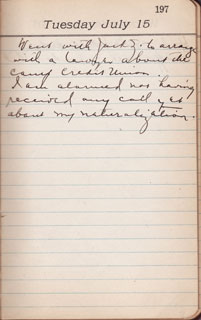
Same as yesterday
in my company were Sister
Clara & husband.
I.M.W.
again writes me to help him
I shall give the letter to Budiener
———-
Matt’s Notes
I can’t quite figure out what the second section of this entry says. I.M.W. (if I’m reading that right) might be a reference to Papa’s brother, Isaac, over in Europe (Papa has started to write something that looks like “Isaac” and crossed it out, though it’s mostly illegible). I’m also having trouble with the last word of the entry (Budinier? Badinez?) so I don’t know to whom or what Papa plans to give “I.M.W’s” letter.

My other theory is that this is a reference to the tubercular acquaintance “I. Marlanoff” from Papa’s January 2nd entry, and “Budiener” is a doctor or representative of a landsmanshaft, or mutual aid society. Supported by dues, such groups served as ready-made social networks for new arrivals, formed religious congregations, and provided medical care, loans and burial services to landsman (people from the same place).
Papa’s charitable fraternal order, B’nai Zion, probably qualifies as such an organization. Many of his old friends are buried in Sons of Zion cemetery plots and I know they ran a credit union and resold life insurance. But while many of the old landsmanshaftn were geared toward people from the same town, I don’t think B’nai Zion was. Such narrow regional focus might even have been on the wane by the 20’s as Jews stitched themselves into a broader community and as formal support became more available from government agencies and organizations like labor unions. This would be consistent with the overall evolution of fraternal organizations, which, as noted earlier, grew less chauvinistic as the path to Americanization grew clearer.
By the way, I learned a lot about the landsmanshaftn during a visit to the Lower East Side Tenement Museum yesterday (they have a link to some good information here) and I also got a much clearer idea of what Papa’s living situation must have been like in early 1924. I’ll add more about that later.

